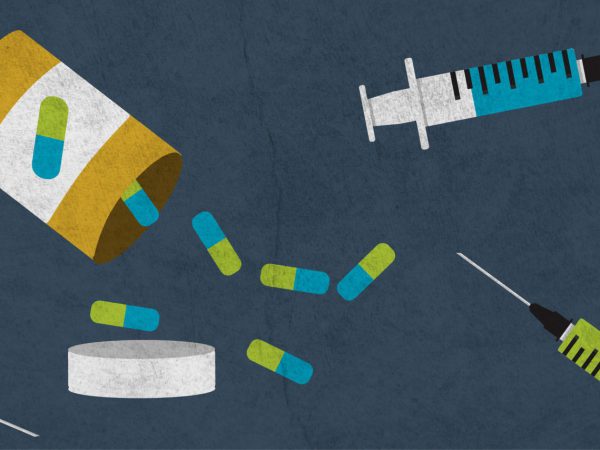Claire Fiddian-Green is the President & CEO of the Richard M. Fairbanks Foundation.
In 2014, more than 1,100 Hoosiers died as a result of drug poisoning – greater than the number of fatalities from car accidents – with prescription opioid misuse and heroin use responsible for a majority of these deaths. In response to the growing crisis, in 2015 the Richard M. Fairbanks Foundation established a goal of reducing opioid use disorder, including prescription drug misuse and heroin use. The number of opioid-related overdose deaths continued to climb nationwide in the following years, reaching upwards of 2,400 deaths in Indiana alone. In 2017, the opioid crisis was formally declared a national “public health emergency.”
In July of this year, the CDC released preliminary estimates that showed – for the first time since 1990 – a decline in overdose deaths in the United States. While we are cautiously optimistic about this one-year decline and its signal of a potential downward trend, we believe that the scale and complexity of the opioid epidemic requires continued attention from leaders and organizations across our state.
Through our philanthropic efforts, since 2015 we have sought to:
- Raise awareness of the scope of the opioid epidemic and evidence-based policies to prevent and reduce opioid misuse;
- Expand access to evidence-based prevention, treatment and harm reduction programs and initiatives, and support pilots for new programs and initiatives; and
- Assess opioid prevention, treatment and harm reduction strategies and evaluate effectiveness of programs.
To best understand the epidemic and identify evidence-based strategies to address it, the Foundation partnered with the Indiana University Richard M. Fairbanks School of Public Health at IUPUI to produce two reports. The Report on the Toll of Opioid Use in Indiana and Marion County was published in 2016, and describes the extent of the toll of the opioid crisis, as well as evidence-based strategies to address the crisis. An updated version, The Changing Landscape of the Opioid Epidemic in Marion County and Evidence for Action, was published in 2018 and includes updated data on the scope of the epidemic and recommendations for action by employers, health systems, lawmakers, K-12 schools, and higher education institutions.
With both reports as guides, the Foundation has awarded a number of grants between 2016 and 2019 focused on Treatment, Harm Reduction and Prevention. For example, we awarded an $813,000 grant to the IU Health Foundation to establish a two-year pilot program with the Indiana Department of Child Services that connects parents with IU Health peer recovery coaches at the moment when they are at greatest risk of losing custody or prolonging separation from their children. In 2017 alone, parent drug abuse was a factor in 53.7% of child protective cases. The program’s specially trained coaches – who themselves have experienced addiction and are in long-term recovery – can offer resources on the spot via virtual care technology, potentially allowing children to remain in the home, or at least spend less time in foster care, while the parent is pursuing recovery.
We also launched Prevention Matters, a four-year, $12 million initiative to give Marion County schools the opportunity to connect with prevention experts, implement evidence-based substance use prevention programs, and ultimately equip students with the skills to help them avoid drugs and alcohol. At scale, the Prevention Matters initiative is projected to serve 177 Indianapolis schools delivering proven prevention programming to 77,500 students in grades K through 12. The Foundation recently released the lessons learned in Year 1 of Prevention Matters with the goal of strengthening the effectiveness and impact of this initiative going forward. These lessons can also bolster other school-based efforts to promote social and emotional learning and prevent substance use.
In 2019, Health & Hospital Corporation of Marion County and the Marion County Public Health Department launched Marion County’s first ever syringe service program with the support of a three-year, $1.45 million grant from the Foundation. The Safe Syringe Access and Support Program is helping to reduce the risk of infectious diseases, prevent overdose deaths, and divert criminal justice involvement in Marion County by expanding access to evidence-based prevention, treatment and harm reduction programs.
Since 2015, the Foundation has awarded more than $18 million to organizations addressing the opioid crisis in Indianapolis. Here is a complete summary of the Foundation’s work since 2015.
Finally, in 2017, we launched the Indiana Funders Collaborative: Focusing on Substance Use Disorder. The collaborative consists of private and public sector funders from across Indiana who are concerned about the opioid epidemic and others forms of substance misuse in their communities. Members of the collaborative meet quarterly to stay informed about the scope of the opioid epidemic in Indiana, and to learn about promising new initiatives and funding opportunities targeted at reducing rates of substance use disorder in Indiana. Since 2018, we have been pleased to co-convene the collaborative with Indiana’s Executive Director for Drug Prevention, Treatment & Enforcement.
We are proud of the work being done by the Foundation’s grantees and other community partners to make a difference in the lives of individuals affected by the opioid epidemic. Through a comprehensive, sustained and cross-sector approach, we believe that Indiana will continue to make meaningful progress in addressing substance use disorder among Hoosiers.


